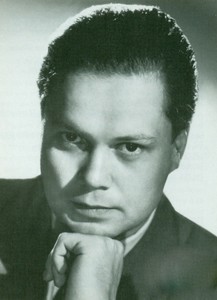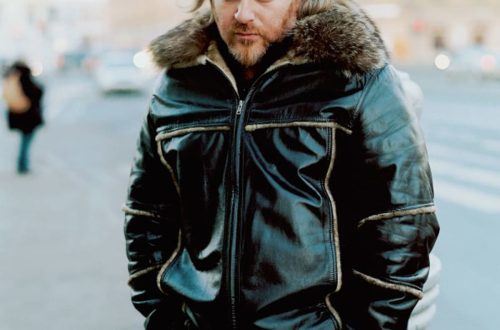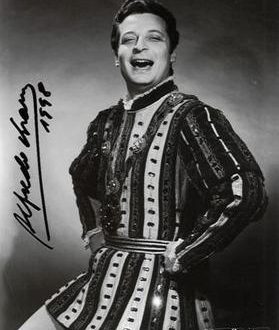
Dietrich Fischer-Dieskau |
Dietrich Fischer-Dieskau

The German singer Fischer-Dieskau was favorably distinguished by a subtle individual approach to a diverse operatic repertoire and songs. The immense range of his voice allowed him to perform almost any program, to perform in almost any opera part intended for a baritone.
He performed works by such different composers as Bach, Gluck, Schubert, Berg, Wolf, Schoenberg, Britten, Henze.
Dietrich Fischer-Dieskau was born on May 28, 1925 in Berlin. The singer himself recalls: “… my father was one of the organizers of the so-called secondary school theater, where, unfortunately, only wealthy students were given the opportunity to watch classical plays, listen to operas and concerts for little money. Everything that I saw there immediately went into processing in my soul, a desire arose in me to immediately embody it myself: I repeated monologues and entire scenes aloud with insane passion, often not understanding the meaning of the words spoken.
I spent so much time harassing the servants in the kitchen with my loud, fortissimo recitations, that in the end she took flight, taking the calculation.
… However, already at the age of thirteen I knew the most significant musical works perfectly – mainly thanks to gramophone records. In the mid-thirties, magnificent recordings appeared, which are now often re-recorded on long-playing records. I completely subordinated the player to my need for self-expression.
Musical evenings were often held in the parental home, in which the young Dietrich was the main character. Here he even staged Weber’s “Free Gunner”, using gramophone records for musical accompaniment. This gave future biographers reason to jokingly claim that since then his increased interest in sound recording has arisen.
Dietrich had no doubts that he would devote himself to music. But what exactly? In high school, he performed Schubert’s Winter Road at school. At the same time, he was attracted by the profession of a conductor. Once, at the age of eleven, Dietrich went with his parents to a resort and performed brilliantly in an amateur conductor competition. Or maybe it’s better to become a musician? His progress as a pianist was also impressive. But that’s not all. Musical science also attracted him! By the end of school, he prepared a solid essay on Bach’s cantata Phoebus and Pan.
The love of singing took over. Fischer-Dieskau goes to study at the vocal department of the Higher School of Music in Berlin. World War II broke out and he was drafted into the army; after several months of preparation, they were sent to the front. However, the young man was not at all attracted by Hitler’s ideas of world domination.
In 1945, Dietrich ended up in a prison camp near the Italian city of Rimini. In these not quite ordinary conditions, his artistic debut took place. One day, the notes of the Schubert cycle “The Beautiful Miller’s Woman” caught his eye. He quickly learned the cycle and soon spoke to the prisoners on a makeshift stage.
Returning to Berlin, Fischer-Dieskau continues his studies: he takes lessons from G. Weissenborn, honing his vocal technique, preparing his repertoire.
He begins his career as a professional singer unexpectedly, having recorded Schubert’s “Winter Journey” on tape. When this recording sounded one day on the radio, letters rained down from everywhere asking for it to be repeated. The program was broadcast almost every day for several months. And Dietrich, meanwhile, is recording all the new works – Bach, Schumann, Brahms. In the studio, the conductor of the West Berlin City Opera, G. Titjen, also heard it. He approached the young artist and said decisively: “In four weeks you will sing at the premiere of Don Carlos by Marquis Pozu!”
After that, Fischer-Dieskau’s operatic career began in 1948. Every year he improves his skills. His repertoire is replenished with new works. Since then, he has sung dozens of parts in the works of Mozart, Verdi, Wagner, Rossini, Gounod, Richard Strauss and others. In the late 50s, the artist played the title role for the first time in Tchaikovsky’s opera Eugene Onegin.
One of the singer’s favorite roles was the role of Macbeth in Verdi’s opera: “In my performance, Macbeth was a blond giant, slow, clumsy, open to the mind-bending sorcery of witches, subsequently striving for violence in the name of power, devoured by ambition and remorse. The vision of the sword arose for one reason only: it was born of my own desire to kill, which overcame all feelings, the monologue was performed in a recitative manner until the scream at the end. Then, in a whisper, I said “It’s all over,” as if these words were mumbled by a guilty smerd, an obedient slave to a cold, power-hungry wife and mistress. In a beautiful D-flat major aria, the soul of the damned king seemed to overflow in dark lyrics, dooming itself to destruction. Horror, fury, fear were replaced almost without transitions – this is where a wide breath was needed for a truly Italian cantilena, dramatic richness for the recitation of recitatives, a Nordic ominous deepening into oneself, tension in order to convey the full weight of deadly affects – this is where the opportunity was play “theater of the world”.
Not every vocalist performed so eagerly in operas by composers of the XNUMXth century. Here, among the best achievements of Fischer-Dieskau are the interpretations of the central parties in the operas The Painter Matisse by P. Hindemith and Wozzeck by A. Berg. He participates in the premieres of new works by H.-V. Henze, M. Tippett, W. Fortner. At the same time, he is equally successful in lyrical and heroic, comic and dramatic roles.
“Once in Amsterdam, Ebert appeared in my hotel room,” recalls Fischer-Dieskau, “and began to complain about the well-known conductor’s problems, they say, record companies remember him only sporadically, theater directors rarely fulfill their promises in practice.
… Ebert admitted that I was well suited to participate in the so-called problem operas. In this thought, he was strengthened by the chief conductor of the theater, Richard Kraus. The latter began to stage the underestimated, better to say almost forgotten, Ferruccio Busoni’s opera Doctor Faust, and to learn the title role, a practitioner, a great connoisseur of theatrical craft, Kraus’s friend Wolf Völker, was attached to me as an “outside director”. Helmut Melchert, a singer-actor from Hamburg, was invited to play the role of Mephisto. The success of the premiere made it possible to repeat the performance fourteen times over two seasons.
One evening in the director’s box sat Igor Stravinsky, in the past an opponent of Busoni; after the end of the performance, he came backstage. Behind the thick lenses of his glasses, his wide-open eyes gleamed with admiration. Stravinsky exclaimed:
“I didn’t know that Busoni was such a good composer! Today is one of the most important opera evenings for me.”
For all the intensity of Fischer-Dieskau’s work on the opera stage, it is only a part of his artistic life. As a rule, he gives her only a couple of winter months, touring in the largest theaters in Europe, and also participates in opera performances at festivals in Salzburg, Bayreuth, Edinburgh in the summer. The rest of the singer’s time belongs to chamber music.
The main part of Fischer-Dieskau’s concert repertoire is the vocal lyrics of romantic composers. In fact, the entire history of German song – from Schubert to Mahler, Wolf and Richard Strauss – is captured in his programs. He was not only an unsurpassed interpreter of many of the most famous works, but also called to a new life, gave listeners anew dozens of works by Beethoven, Schubert, Schumann, Brahms, which had almost completely disappeared from concert practice. And many talented performers have gone down the path open to them.
All this sea of music is recorded by him on the records. Both in terms of quantity and quality of recordings, Fischer-Dieskau certainly occupies one of the first places in the world. He sings in the studio with the same responsibility and with the same intense creative excitement with which he goes out to the public. Listening to his recordings, it’s hard to get rid of the idea that the performer is singing for you, being somewhere around here.
The dream of becoming a conductor did not leave him, and in 1973 he took up the conductor’s baton. After that, music lovers had the opportunity to get acquainted with his transcription of some symphonic works.
In 1977, Soviet listeners were able to see for themselves the skill of Fischer-Dieskau. In Moscow, together with Svyatoslav Richter, he performed songs by Schubert and Wolf. Vocalist Sergei Yakovenko, sharing his enthusiastic impressions, emphasized: “The singer, in our opinion, as if melted into a single whole the principles of the German and Italian vocal schools … Softness and elasticity of sound, absence of throat overtones, deep breathing, alignment of voice registers – all these features , characteristic of the best Italian masters, are also inherent in the vocal style of Fischer-Dieskau. Add to this the endless gradations in the pronunciation of the word, the instrumentality of sound science, the mastery of pianissimo, and we get an almost ideal model for the performance of both operatic music, and chamber, and cantata-oratorio.
Another dream of Fischer-Dieskau did not remain unfulfilled. Although he did not become a professional musicologist, he wrote extremely talented books about German song, about the vocal heritage of his beloved Schubert.





